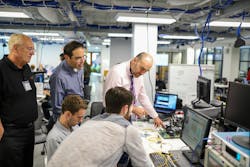Ethernet Alliance wrapping up latest High-Speed Networking Interop Plugfest
The Ethernet Alliance is wrapping up yet another High Speed Networking (HSN) Plugfest this week at the University of New Hampshire InterOperability Laboratory (UNH-IOL) in Durham, NH. The fourth such event to provide participants with the ability to test the interoperability of their products for applications from 25 Gigabit Ethernet to 400 Gigabit Ethernet (GbE), this week’s HSN Plugfest drew a greater number of companies than the previous iteration, including some who joined the Ethernet Alliance just so that they could participate, according to David Chalupsky, plugfest chair and Ethernet Alliance board of directors member, as well as network product architect at Intel Corp.
The members-only event, which ends tomorrow, drew 18 participating companies, five of whom were new to such plugfests, Chalupsky reports via email. The newcomers came from the optical transceiver, Ethernet switching equipment, and test and measurement (physical layer and protocol analysis) camps, he wrote. Meanwhile, previous participants tried out new technology; two longstanding members brought 400GbE switching silicon for the first time, Chalupsky mentioned.
“The rising number of new companies participating in our HSN Plugfest series illustrates just how far these rapidly maturing Ethernet technologies are spreading. The drive to deliver more products to market faster is fueling a surge in participation from companies seeking to take part in our plugfests,” commented Greg McSorley, president, Ethernet Alliance, and technical business development manager, Amphenol Corp., via an Ethernet Alliance press release about the event. “Plugfests are a cost-effective avenue for companies to securely test against an array of costly equipment – particularly pre-release products – that they may not have otherwise had access to. It is a perfect representation of how the Ethernet Alliance is working to foster seamless, end-to-end interoperability across the Ethernet landscape while delivering added value for our members.”
The plugfests typically draw participation from companies who bring either pre- or post-commercialized products such as network interface cards (NICs); switches, field-programmable gate arrays (FPGAs), protocol analyzers, interconnects such as optical transceivers and passive and active optical and copper cabling, and test equipment. With this week’s event ongoing, it’s too early to determine how well the participants are doing or whether common problems have been uncovered. The previous plugfest, held at the end of this past April, saw frame error rate (FER) tests produce a 100% pass rate and, overall, functional interoperability tests achieved an aggregated 97.5% pass rate (see “Latest Ethernet Alliance High-Speed Networking Plugfest has 97% pass rate”).
Meanwhile, the Ethernet Alliance has already planned for the fifth plugfest at UNH-IOL, which will take place the week of April 20, 2020. “We have established a 6-month cadence, and I believe that members are finding benefit in that approach,” wrote Chalupsky. “A specific focus may appear closer to the event. For example, in 2020 we expect to see IEEE P802.3ck (100Gb/s electrical signaling) specifications start to mature, and early components capable of 100 Gb/s signaling ready to test. We’ll let the membership make suggestions throughout the year via our Higher Speed Networking subcommittee, and in the end it’s the group that signs the NDA to join the event [that] will drive the specifics.”
The plugfests are open to Ethernet Alliance members. The group provides membership information on its website, as well as additional information about the plugfests and other Alliance activities.
For related articles, visit the Optical Technologies Topic Center.
For more information on optical modules and suppliers, visit the Lightwave Buyer’s Guide.
To stay abreast of optical communications technology, subscribe to Lightwave’s Enabling Technologies Newsletter.
About the Author

Stephen Hardy
Editorial Director and Associate Publisher, Lightwave
Stephen Hardy is editorial director and associate publisher of Lightwave and Broadband Technology Report, part of the Lighting & Technology Group at Endeavor Business Media. Stephen is responsible for establishing and executing editorial strategy across the both brands’ websites, email newsletters, events, and other information products. He has covered the fiber-optics space for more than 20 years, and communications and technology for more than 35 years. During his tenure, Lightwave has received awards from Folio: and the American Society of Business Press Editors (ASBPE) for editorial excellence. Prior to joining Lightwave in 1997, Stephen worked for Telecommunications magazine and the Journal of Electronic Defense.
Stephen has moderated panels at numerous events, including the Optica Executive Forum, ECOC, and SCTE Cable-Tec Expo. He also is program director for the Lightwave Innovation Reviews and the Diamond Technology Reviews.
He has written numerous articles in all aspects of optical communications and fiber-optic networks, including fiber to the home (FTTH), PON, optical components, DWDM, fiber cables, packet optical transport, optical transceivers, lasers, fiber optic testing, and more.
You can connect with Stephen on LinkedIn as well as Twitter.
